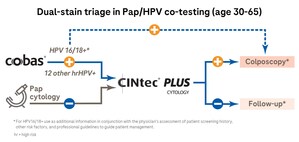Pivotal Study Validates Roche's cobas® HPV Test with HPV-16 and 18 Genotyping for Identifying Women at Highest Risk for Cervical Cancer
ATHENA study shows the cobas HPV Test advances the standard of care by providing valuable information on the risks associated with the genotypes which cause 70 percent of cervical cancer
PLEASANTON, Calif., Feb. 24, 2011 /PRNewswire/ -- Roche (SIX: RO, ROG; OTCQX: RHHBY) announced that a study published online today in the American Journal of Clinical Pathology demonstrated the ability of the cobas HPV Test to individually detect HPV-16 and HPV-18, two of the highest risk HPV genotypes causing 70 percent of cervical cancer cases. The ATHENA (Addressing THE Need for Advanced HPV Diagnostics) study, which involved more than 47,000 women, validates the cobas HPV Test for triage of patients with an equivocal Pap test, a cytology category indicating atypical cells of undetermined significance (ASC-US). This is the first in a series of papers to be published from the ATHENA study.
"At least four out-of five women in the U.S. will have been infected with HPV at some point in their lives, and it's critical to have early and accurate information about which individuals are at greatest risk for possible progression to cervical cancer," said Mark H. Stoler, MD, Professor and Associate Director of Surgical Pathology and Cytopathology, at the University of Virginia Health System. "Results from ATHENA demonstrated that the cobas HPV Test is a clinically valid tool for physicians needing to manage the ASC-US population as it identifies not only high-risk HPV, but also HPV-16/HPV-18 without additional tests. This ability to identify genotype-related risk will also be highly useful if revisions to ASC-US management guidelines are considered," concluded Dr. Stoler.
Results from the ATHENA study also demonstrated that the sensitivity of the cobas HPV Test was equivalent to the current standard of testing, while providing the added benefit of clinically valuable information regarding the HPV-16 and HPV-18 genotypes in a single test. Previously presented ATHENA data confirmed that the cobas HPV test detected cervical pre-cancer missed by the Pap test, underscoring the limitations of cervical cancer screening with the Pap test alone.
"Arming more clinicians with HPV testing that has HPV-16 and HPV-18 genotyping will bring us one step closer to eradicating cervical cancer," said Paul Brown, Head of Roche Molecular Systems. "Results of the ATHENA study underscore the potential for a state-of-the-art diagnostic test to specifically identify women at highest risk for cervical disease."
About the Roche ATHENA Clinical Trial
The Roche ATHENA study for the cobas HPV Test is the largest U.S.-based registration study for cervical cancer screening, including more than 47,000 women. The study is designed to answer current medical and scientific questions about the importance of testing for high-risk HPV genotypes in cervical cancer screening and to provide clinical information about the specific HPV genotypes that place women at highest risk for developing cervical cancer. Results show the cobas HPV Test is comparable to the current standard of testing. Results also demonstrated that 1 in 10 women, age 30-years and older, who tested positive for HPV - 16 and/or 18 by the cobas HPV Test had cervical pre-cancer, although their Pap test was normal.
About the cobas HPV Test
As demonstrated in the ATHENA trial, Roche's cobas HPV Test is the only HPV test under investigation in the U.S. that simultaneously detects 12 high-risk HPV types (HPV types 31, 33, 35, 39, 45, 51, 52, 56, 58, 59, 66 and 68) as a pooled result, as well as HPV genotypes 16 and 18 individually. Roche launched the cobas HPV Test in countries that accept CE Mark in 2009. The test is currently under review and pending Pre-Market Approval (PMA) by the U.S. Food and Drug Administration (FDA). The test is not currently available in the United States.
About Human Papillomavirus and Cervical Cancer
Persistent infection with human papillomavirus is the principal cause of cervical cancer in women, with HPV implicated in greater than 99 percent of cervical cancers worldwide. Of the more than 118 different types of HPV, 13-16 types are currently considered high-risk for the development of cervical cancer and its precursor lesions. HPV types 16 and 18 have been identified as the highest risk genotypes, detected in approximately 70 percent of cervical cancers. Nucleic acid (DNA) testing is a sensitive and non-invasive method for determining the presence of HPV infection.
According to the National Cancer Institute, there are 12,200 new cases of cervical cancer in the United States and 4,210 deaths due to the disease. The World Health Organization estimates there are 470,000 new cases of cervical cancer annually.
About Roche
Headquartered in Basel, Switzerland, Roche is a leader in research-focused healthcare with combined strengths in pharmaceuticals and diagnostics. Roche is the world's largest biotech company with truly differentiated medicines in oncology, virology, inflammation, metabolism and CNS. Roche is also the world leader in in-vitro diagnostics, tissue-based cancer diagnostics and a pioneer in diabetes management. Roche's personalised healthcare strategy aims at providing medicines and diagnostic tools that enable tangible improvements in the health, quality of life and survival of patients. In 2010, Roche had over 80'000 employees worldwide and invested over 9 billion Swiss francs in R&D. The Group posted sales of 47.5 billion Swiss francs. Genentech, United States, is a wholly owned member of the Roche Group. Roche has a majority stake in Chugai Pharmaceutical, Japan. For more information: www.roche.com.
All trademarks used or mentioned in this release are protected by law.
SOURCE Roche Diagnostics
WANT YOUR COMPANY'S NEWS FEATURED ON PRNEWSWIRE.COM?
Newsrooms &
Influencers
Digital Media
Outlets
Journalists
Opted In





Share this article